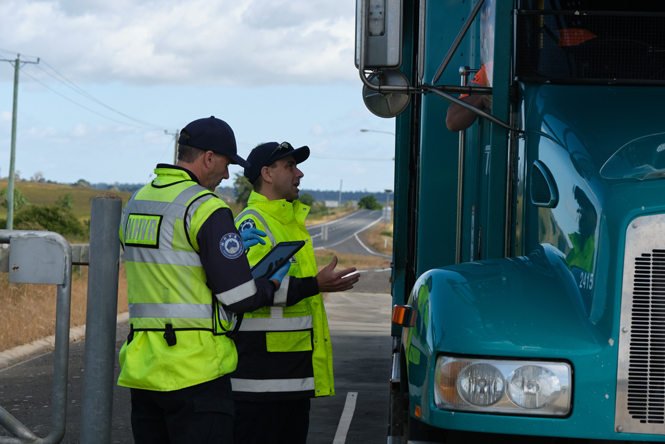Regulatory Advice - Providing false or misleading information to the NHVR
Regulatory Advice - Providing false or misleading information to the NHVR
National
Heavy
Vehicle
Regulator
Note: This information is intended as general guidance only and does not constitute legal advice. We encourage you to obtain independent advice about your legal obligations. If you have any feedback on the information provided please contact us at info@nhvr.gov.au
This regulatory advice explains why providing false or misleading information about your heavy vehicle transport activities to the National Heavy Vehicle Regulator (NHVR), other authorised officers or responsible persons is prohibited by law.

Who is this advice for?
This regulatory advice is intended for anyone who works or engages in transport activities in the heavy vehicle transport industry.
What are my legal obligations?
The Heavy Vehicle National Law (HVNL) defines how people and businesses who operate heavy vehicles are expected to behave.
Under the HVNL, all participants in the industry (from company officers to heavy vehicle drivers and other employees) must create, use and provide accurate and robust information that is based on fact.
The NHVR and other officials use this information to provide services to industry - such as road network access and vehicle standards exemptions - as well as informing compliance monitoring and enforcement activities. Submitting false or misleading information, either knowingly or recklessly, is an offence and the offender may be liable for a penalty under HVNL sections 701-703.
What are the legal consequences?
If you provide the NHVR or another responsible person with false or misleading information, you may be issued a court imposed fine or other penalty.
Why is this important to my business?
To ensure the safety of transport activities, participants in the heavy vehicle industry must be able to act on information that is truthful, accurate and easily verifiable. Information that is hard to find, inaccurate, incomplete, incorrect or unreliable may lead to a safety risk.
Definitions
Note: The terms false or misleading are not defined in the HVNL, so the common meaning applies.
- False means not true. Information is false even if you had a mistaken belief the information was true. It’s not necessary to prove either knowledge of the falsity or an intention to deceive.
- Misleading means to lead into error. Conduct may be misleading without an intention to mislead. Misleading has a wider meaning than false, and a statement, document or representation may be misleading even if it is literally true. Omitting information to create an incomplete record may be misleading.
- Official means a person that exercises a function under the HVNL, including an authorised officer, a police officer, a person who operates under the direction or authority of the NHVR, a road authority or Transport Certification Australia Limited.
- Responsible person, for a heavy vehicle, means a person having, at a relevant time, a role or responsibility associated with road transport using the vehicle in various types of situations detailed in the HVNL.
- Knowingly means the person knows the statement or document is misleading and provides that statement or document to an official or responsible person.
- Recklessly means there is a possibility or risk the statement might be false or misleading, or that the document might contain false or misleading information, but the person makes the statement or gives the document anyway.
- Statement includes a written document, but also includes information provided by other means, such as a verbal statement, gesture, or nod of the head.
How can I comply with the HVNL?
To comply with legal obligations under the HVNL, you must not:
- include something in a work record that you know, or ought reasonably to know, is false or misleading
- knowingly or recklessly make false or misleading statements to an official or a responsible person
- knowingly or recklessly give an official a document containing false or misleading information.
Recording or providing information
CoR parties, executives, heavy vehicle drivers and anyone in the heavy vehicle industry should:
- familiarise themselves with, understand and comply with HVNL requirements around record-keeping and the provision of information, including applications, transport documentation and work records
- be open and honest
- record and provide complete, accurate and timely information
- not obstruct, hinder or threaten officials, or someone who helps officials, from exercising their powers under the HVNL.
Information can be:
- written or contained in a document
- verbal, including gestures - for example, a nod or shake of the head
- any kind of information, not only that which is required to be provided under the HVNL
- information that, if relied on, might cause other responsible persons to breach the HVNL.
Avoiding liability for false or misleading information
Businesses must take reasonable precautions to prevent employees from providing false or misleading information to avoid liability.
If there is any doubt about the accuracy of information provided, ensure the person providing the information makes a note of any known deficiencies and, if possible, why that information is lacking.
The HVNL requires all work records, documents, statements, and information to be truthful, factual and complete. Reliable information is an essential component to enable CoR parties, executives and drivers of heavy vehicles to manage their own safety risks. Good record-keeping practices that ensure information is easy to find, accurate, complete, correct and robust prevents non-compliance and helps manage safety risks.
What are the NHVR’s powers to obtain information?
The NHVR has a risk-based and balanced approach to regulating heavy vehicles under the HVNL. It relies on accurate and robust information to inform its decision-making on the services and products provides to industry, and to inform its compliance and enforcement activities.
The NHVR uses its information-gathering powers under the HVNL to obtain information that:
- relates to possible breaches of the HVNL
- assists in providing services to the heavy vehicle industry
- assists in monitoring and enforcing compliance with the HVNL.
You are not obliged to provide to the NHVR information that is under legal privilege. If in doubt, let the NHVR know there is information you believe may be legally privileged and seek independent legal advice.
The NHVR treats all information provided in accordance with the 'Information Privacy Principles' in the Information Privacy Act 2009 (Qld) and the NHVR Privacy Policy.
Scenarios – Examples of providing false or misleading information
1. A driver falsifies his work diary
Sam is the driver of a heavy vehicle undertaking a 100+km journey from his base. For this journey, he's required to carry and complete a National Driver Work Diary. He has made entries in his work diary that misrepresent his work and rest hours, showing breaks he did not take.
Sam is stopped by an NHVR officer, who examines Sam’s work diary and questions him about his recorded work and rest hours. Despite the officer’s suspicion about Sam’s work diary entries, Sam insists the work diary entries are correct, rather than admit he's made the false entries.
Through further investigation, the officer confirms that the work diary entries are, in fact, false and misleading.
Scenario analysis:
In certain circumstances, a driver is required to carry and complete a National Driver Work Diary to record information relevant to the journey they are undertaking. The HVNL requires that all information recorded in a work diary is accurate and complete.
In this scenario, Sam is required to record his work and rest hours to demonstrate compliance with his relevant HVNL work and rest hour regime. Because Sam insisted his work diary entries were correct when he knew they weren’t, he is issued a court attendance notice for providing false or misleading information along with fines for work and rest hour offences.
If Sam had answered the NHVR officer’s questions truthfully, it may have resulted in a different outcome. A driver who cooperates and gives truthful and accurate information to the NHVR is less likely to be prosecuted.
In this instance, the transport and logistics company involved was also investigated over its perceived lack of controls and supervision.
2. A driver provides false vehicle mass limits to a loader
Tom is loading grain on heavy vehicles for road transport to a receiver. Henry is driving the heavy vehicle and provides information to Tom about the vehicle’s mass limits that Henry knows is false.
Tom loads the vehicle to the mass limits provided by Henry, resulting in the vehicle being overloaded.
Henry has committed an offence under the HVNL by knowingly providing false information to Tom about something that would be an offence under the HVNL.
Scenario analysis:
Under the HVNL, a responsible person must not give another responsible person information they know, or ought reasonably to know, is false or misleading.
One of the loader’s responsibilities is to ensure the load they place on a heavy vehicle does not exceed its mass limits. Unreliable vehicle mass information is a safety risk to road infrastructure, the driver, and all parties in the supply chain. Safety systems rely on the use of accurate vehicle mass information to prevent potential harm or loss.
Any responsible person must ensure the information they provide to another responsible person is accurate and complete. Henry may face fines or court actions for knowingly providing false or misleading information to Tom.
THIS DOCUMENT IS UNCONTROLLED IN HARD COPY FORMAT.

 Accessibility tools
Accessibility tools

